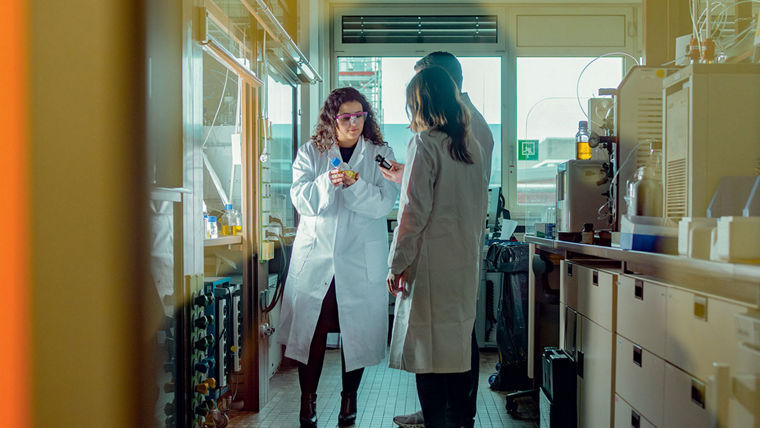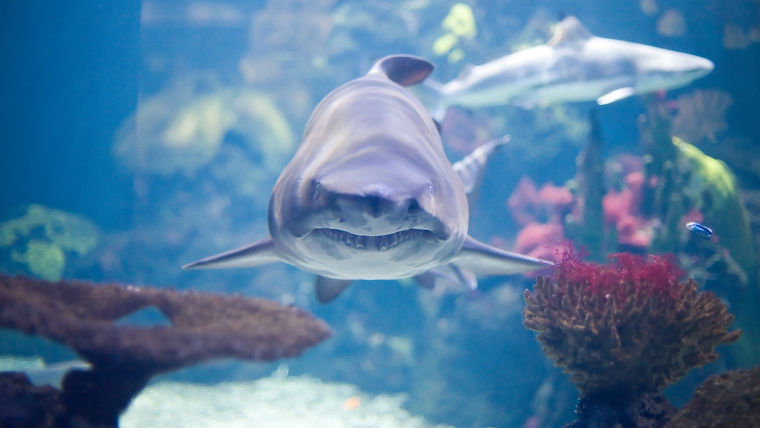Although sharks are one of the world’s most important and useful animal groups, they’ve been given a bad name by a best-selling novel and a blockbuster movie. The 1974 thriller Jaws portrays the gristly fish species as a man-eating monster. Both the author Peter Benchley and the film director Steven Spielberg explicitly regretted this portrayal afterwards. Nevertheless, sharks’ alleged monstrosity has made them sought-after trophies for sport fishermen. Many sharks also die as bycatch in fisheries. Their fins are considered a coveted delicacy in Asia.
The pharmaceutical and cosmetics industry is also putting increased pressure on some shark species that are already highly endangered. Sharks are a source of squalene, a substance that also plays an important role in human metabolism. Squalene is used in cosmetic applications, as an ingredient in medicines, and in vaccines. Evonik can now offer the pharmaceutical industry a GMP plant-based alternative that delivers even more reliable results. GMP stands for Good Manufacturing Practice and is a guarantee of uncompromisingly high quality.
Squalene is traditionally extracted from the liver of sharks,whose Latin name Squalus also gives this substance its name. In cartilaginous fish, the large oily liver partially takes over the function of the swim bladder in bony fish. A shark liver makes up between 20 and 40 percent of a shark’s body weight. Squalene currently plays an important role in inactivated vaccines, particularly flu vaccines. It can also be used in pharmaceutical creams and ointments to make them more effective. The sebum produced by human skin also contains a proportion of squalene.

Rima Jaber has a Ph.D. in pharmaceutical technology and is the global product manager at Evonik Health Care for lipids in parenteral drug delivery solutions - in other words, routes of administration in which the active ingredients do not pass through the gastrointestinal tract. Jaber is aware of the threat that the use of animal-based raw materials poses to the populations of this animal group, which is more than 450 million years old. “Animal-derived squalene contributes to the decimation of shark populations,” she says.


An impending cascade
In the past the spiny dogfish, Squalus acanthias, was one of the most common shark species in the world. Today it is already considered critically endangered in the north-east Atlantic. This is largely due to the fact that the boneless belly flap of the spiny dogfish is a coveted fish specialty. Some common names for the fish, such as “huss” (UK) or “Seeaal” (sea eel, Germany) conceal their true origin. In the German North Sea, the spiny dogfish is considered extremely rare and is threatened with extinction, according to the German Red List.
Ulrich Karlowski, a biologist who is a board member of the German Foundation for Marine Conservation, explains the important role that sharks play in marine ecosystems: “The more than 500 shark species known today act as important apex predators and mesopredators—that is, they function like a gigantic oceanic cleaning crew. Put simply, they are an essential part of the ocean’s health police.” The population of almost all the monitored deep-sea shark species has declined by an average of 70 percent over the past 50 years. Because there is a lack of data for many species, it is not even possible to assess the size of their current populations.
Ulrich Karlowski says that the extinction of sharks would be devastating for the world’s oceans: “Sharks are one of the key species in the oceans. Their disappearance would trigger a cascade in which ecosystems such as tropical coral reefs, which cannot exist without healthy shark populations, would perish.” It would be difficult to predict the consequences of such a cascade for countless marine species that are wholly or partially dependent on coral reefs. The consequences would also be drastic for human populations. Hundreds of thousands of small-scale fishermen would lose their livelihoods due to the collapse of fish stocks, and millions of people in the Global South would lose a significant part of their food supply. “It is therefore in people’s best interests to protect sharks, reduce the pressure of exploitation, and rebuild their populations,” Karlowski concludes.

A pharmaceutical-grade substitute
The protection of cartilaginous fish is particularly important, as these species reproduce very slowly. Species living in the deep sea, such as the Greenland shark, have a life expectancy of about 400 years and do not reach sexual maturity until they are 150 years old. The heavily fished mako shark takes at least 20 years. In addition, sharks have very few offspring.
The extraction of squalene from shark livers is not the central problem leading to the decimation of shark populations. However, on average three sharks have to die to produce one kilo of squalene. In the future, plants could serve as an alternative source of this raw material.
Until now, it has been a hurdle to extract it from plants in the quantity and purity required for pharmaceutical products. But Evonik has now succeeded in producing PhytoSquene®, a pharmaceutical-grade substitute product. The raw material for PhytoSquene® is the oil of amaranth, a pseudo-cereal from the Amaranthaceae family. This plant is cultivated in many parts of the world, is also suitable as food, and is very beautiful with a deep-purple, lush flowered stem. “We have a high security of supply of this raw material due to the large number of possible cultivation areas,” explains Rima Jaber.
Prof. Katrin Böhning-Gaese, the director of the Senckenberg Biodiversity and Climate Research Centre in Frankfurt am Main, calls the project an example of the term “seeds of the good Anthropocene.” She’s referring to the possible positive transformation of the current geological age, during which human beings have become one of the most important factors influencing the biological, geological, and atmospheric processes on earth. “Transformation happens when lots of small things change,” she says. “Such model projects are necessary, helpful and inspiring.”

»Wherever we can replace animal products with plant-based or biotechnologically produced products, we do so«
THOMAS RIERMEIER HEAD OF THE HEALTH CARE BUSINESS LINE
PhytoSquene® is one of Evonik’s Next Generation Solutions - that is, products with outstanding sustainability benefits. The topic of sustainability has become increasingly important in the pharmaceutical industry in recent years. However, the production of the new plant-based raw material initially presented Evonik’s researchers with several challenges - for example, the need to guarantee extremely high purity. The solution was developed together with the process engineering team and consists of upstream clarification of the oil in combination with a chromatographic process. This enabled a purification process that is not only economical but also guarantees the production of squalene with a purity of 99 to 100 percent. Evonik now produces the concentrate in this outstanding pharmaceutical grade at its Dossenheim site, near Heidelberg.
“The residual oil produced during clarification is also a valuable natural raw material,” says Jaber. “I’m confident that we will also find a useful application for it.” PhytoSquene® is part of the portfolio of products of non-animal origin that Evonik has introduced in recent years. Another example is PhytoChol®, a plant-based cholesterol that can be used in the production of mRNA and gene therapeutics as well as in cell culture. The collagen Vecollan®, which is produced by fermentation and is suitable for medical applications, also contains no animal or human materials. Vecollage®, another plant-based collagen, is produced for the beauty and personal care sector.
These products open up new possibilities for vegans and people who, for cultural or religious reasons, do not want to use medicines or care products containing animal ingredients. Today every pharmaceutical product must already state whether the active ingredients it contains come from animal or plant sources. “Wherever we can replace animal products with plant-based or biotechnologically produced products, we do so,” explains Thomas Riermeier, the head of the Health Care business line. “In this way we contribute to the preservation of biodiversity and at the same time ensure the maximum consistency, quality, and purity of the product.”

A reliable booster
There is a huge demand for squalene in the pharmaceutical industry. Squalene enhances the effect of drugs and the immune response of vaccines. It serves as an adjuvant, enabling lower doses, thus limiting possible side effects. However, there can be quality issues with squalene from animal sources. Because sharks are usually at the top end of the food chain, toxins such as methylmercury accumulate in their livers. The Federal Environment Agency warns that this substance can damage the nervous system. The composition of the animal-origin squalene also varies from batch to batch, and that leads to fluctuations in the quality of the end product.
The amaranth oil used by Evonik, on the other hand, is of consistently high quality and free of mercury residues. “The product must also meet the same specifications as squalene of animal origin—for example, the requirements of the European Pharmacopoeia,” says Jaber. This reference work records the quality standards for drugs and the substances used to manufacture them, for all 47 member states of the Council of Europe.
Intensive research is currently being conducted into the use of squalene in mRNA vaccines. Initial tests have shown that their addition increases shelf life. This would be a major advance, especially for countries where temperature-sensitive vaccines cannot be kept refrigerated throughout.
Intensive research is also currently being carried out in the field of cancer research into the use of squalenes in mRNA therapies. “The initial results are very interesting,” says Jaber. At Evonik’s site in Vancouver, Canada, where research is being conducted on lipid nanoparticles (LNPs) for mRNA vaccines and therapies, scientists are now also working on the use of plant squalene with new formulations. “I am confident that we will also be able to replace squalene from animal sources with PhytoSquene® in future solutions,” Jaber explains.

Evonik Wins CPHI Pharma Award for Plant-Based Squalene PhytoSquene®
Evonik has won this year's CPHI Pharma Award in the “Sustainability” category. "Sustainability drives us! This award confirms that we are pursuing the right goals: to offer our customers alternatives that enhance patient outcomes and protect our planet,” said Yann d'Hervé, Head of the Health Care business line at Evonik.
The annual CPHI Excellence in Pharma Awards were launched in 2004 to celebrate cross-industry innovators that drive the industry forward. Evonik was presented with the award on October 8, 2024 at the CPHI pharmaceutical fair in Milan.
CPHI is the world's largest trade show for the pharmaceutical industry, covering the entire supply chain from finished ingredients and dosages to machinery, biotechnology, and packaging.



